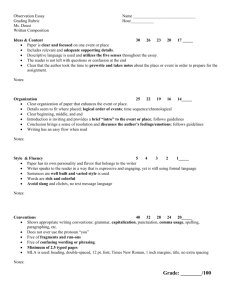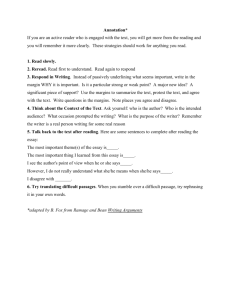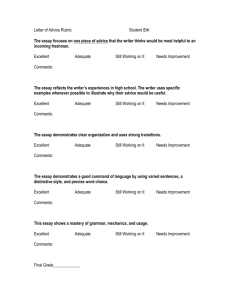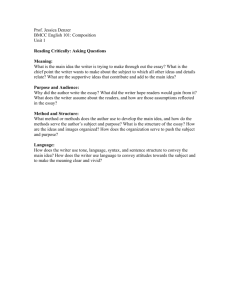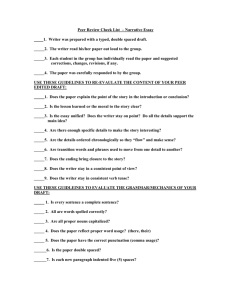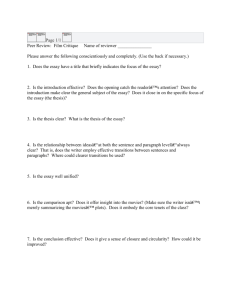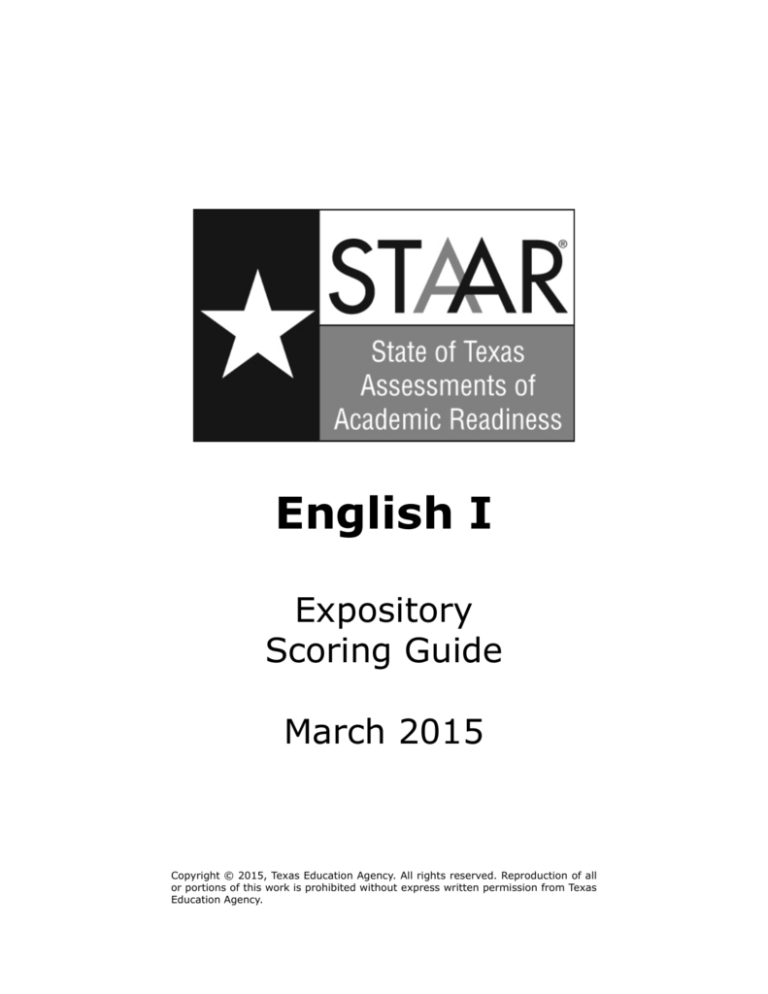
English I
Expository
Scoring Guide
March 2015
Copyright © 2015, Texas Education Agency. All rights reserved. Reproduction of all
or portions of this work is prohibited without express written permission from Texas
Education Agency.
English I
Expository Prompt
Read the following quotation.
Right actions for the future are the best apologies for
wrong ones in the past.
—Tryon Edwards
Sometimes changing your behavior is the only way to make up for a past mistake. Think
carefully about this statement.
Write an essay explaining how actions can be more powerful than words.
Be sure to —
•
•
•
•
clearly state your thesis
organize and develop your ideas effectively
choose your words carefully
edit your writing for grammar, mechanics, and spelling
STAAR English I Expository
Score Point 1
The essay represents a very limited writing performance.
Organization/Progression
The organizing structure of the essay is inappropriate to the purpose or the
specific demands of the prompt. The writer uses organizational strategies
that are only marginally suited to the explanatory task, or they are
inappropriate or not evident at all. The absence of a functional organizational
structure causes the essay to lack clarity and direction.
Most ideas are generally related to the topic specified in the prompt, but the
thesis statement is missing, unclear, or illogical. The writer may fail to
maintain focus on the topic, may include extraneous information, or may
shift abruptly from idea to idea, weakening the coherence of the essay.
The writer’s progression of ideas is weak. Repetition or wordiness sometimes
causes serious disruptions in the flow of the essay. At other times the lack of
transitions and sentence-to-sentence connections causes the writer to
present ideas in a random or illogical way, making one or more parts of the
essay unclear or difficult to follow.
Development of Ideas
The development of ideas is weak. The essay is ineffective because the writer
uses details and examples that are inappropriate, vague, or insufficient.
The essay is insubstantial because the writer’s response to the prompt is
vague or confused. In some cases, the essay as a whole is only weakly linked to
the prompt. In other cases, the writer develops the essay in a manner that
demonstrates a lack of understanding of the expository writing task.
Use of Language/Conventions
The writer’s word choice may be vague or limited. It reflects little or no
awareness of the expository purpose and does not establish a tone
appropriate to the task. The word choice may impede the quality and clarity
of the essay.
Sentences are simplistic, awkward, or uncontrolled, significantly limiting the
effectiveness of the essay.
The writer has little or no command of sentence boundaries and spelling,
capitalization, punctuation, grammar, and usage conventions. Serious and
persistent errors create disruptions in the fluency of the writing and
sometimes interfere with meaning.
Texas Education Agency
Student Assessment Division
March 2015
STAAR English I
March 2015
Expository — 1
Score Point 1
In this very limited essay, the writer’s response to the prompt is vague and confused. She does
not provide a thesis; instead, she attempts to explain or reword the Tyron Edwards quotation
in various ways throughout the essay. However, the writing is unclear, repetitive, and difficult
to follow. The writer offers a brief example of someone who can make up for ruining a party by
throwing another party, but the language used in this example is vague and ineffective. Because
the writer’s focus is on doing the right thing to make up for past wrongs rather than on how
actions can be more powerful that words, the essay is not responsive to the specific demands
of the prompt.
STAAR English I
March 2015
Expository — 2
Score Point 1
In this very limited writing performance, the writer provides the thesis that “action is a lot more
powerful than words because words could be lies.” He attempts to support this thesis with two
unconnected examples. The first example (people saying they’re unafraid but never proving it)
is vague and not explicitly connected to the idea that words can be lies. The second example
(finding out your significant other has been cheating on you) is insufficiently developed. In
addition, the writer’s uncontrolled sentences and lack of appropriate punctuation between
sentences are serious problems, especially at the high school level, since they create disruptions
in the fluency of the writing and significantly weaken the essay.
STAAR English I
March 2015
Expository — 3
Score Point 1
The writer’s approach to the topic is confused. Although she asserts in several places that
actions are more powerful than words, she uses personal examples that seem to support the
opposite idea (words are more powerful than actions). For example, the writer states, “I have
had a time when I expressed myself in a wrong way and it almost got me into trouble.” In this
sentence, it is unclear whether the writer’s use of the word “expressed” means “revealed in
words” or “revealed by actions.” Because no additional explanatory information is included, it
is not clear what point the writer is trying to make or what the ideas in the essay are meant to
support. Uncontrolled sentences further contribute to the lack of clarity. The result is an essay
that is insubstantial and ineffective.
STAAR English I
March 2015
Expository — 4
Score Point 1
In this very limited performance, the writer asserts that actions can be more powerful than
words. However, he fails to provide any appropriate support for this idea. Instead, he lists a series
of quotations that are similar to the quotation in the prompt and intersperses these quotations
with repetitive explanations of what they mean. This random and repetitive presentation of
ideas makes the essay lack direction and coherence. Limited word choice and uncontrolled
sentences further impede the clarity of the writing. These problems make it difficult to follow
the writer’s train of thought or understand what he is trying to say.
STAAR English I Expository
Score Point 2
The essay represents a basic writing performance.
Organization/Progression
The organizing structure of the essay is evident but may not always be
appropriate to the purpose or the specific demands of the prompt. The essay
is not always clear because the writer uses organizational strategies that are
only somewhat suited to the expository task.
Most ideas are generally related to the topic specified in the prompt, but the
writer’s thesis statement is weak or somewhat unclear. The lack of an
effective thesis or the writer’s inclusion of irrelevant information interferes
with the focus and coherence of the essay.
The writer’s progression of ideas is not always logical and controlled.
Sometimes repetition or wordiness causes minor disruptions in the flow of
the essay. At other times transitions and sentence-to-sentence connections
are too perfunctory or weak to support the flow of the essay or show the
relationships among ideas.
Development of Ideas
The development of ideas is minimal. The essay is superficial because the
writer uses details and examples that are not always appropriate or are too
briefly or partially presented.
The essay reflects little or no thoughtfulness. The writer’s response to the
prompt is sometimes formulaic. The writer develops the essay in a manner
that demonstrates only a limited understanding of the expository writing
task.
Use of Language/Conventions
The writer’s word choice may be general or imprecise. It reflects a basic
awareness of the expository purpose but does little to establish a tone
appropriate to the task. The word choice may not contribute to the quality
and clarity of the essay.
Sentences are awkward or only somewhat controlled, weakening the
effectiveness of the essay.
The writer demonstrates a partial command of sentence boundaries and
spelling, capitalization, punctuation, grammar, and usage conventions. Some
distracting errors may be evident, at times creating minor disruptions in the
fluency or meaning of the writing.
Texas Education Agency
Student Assessment Division
March 2015
STAAR English I
March 2015
Expository — 5
Score Point 2
In this basic writing performance, the writer attempts to explain that actions hurt more
than words because the hurt caused by actions “stays with you.” She explains that fighting,
bullying, spilling someone’s drink, or throwing something at someone are all actions that can
hurt but that a person can make up for these actions by apologizing, changing behavior, and
not being mean. While all these examples are appropriate, they are only partially presented,
causing the overall level of development to be superficial. In addition, the flow of ideas is not
always smooth due to some wordiness and repetition (I know it sounds kind of stupid but it’s
true; That may sound crazy but it’s also true). However, despite these minor disruptions, the
progression of ideas from sentence to sentence is logical.
STAAR English I
March 2015
Expository — 6
Score Point 2
In this essay, the conclusion functions as the clearest, most explicit thesis statement. The writer provides a number
of examples—running a 40-yard dash, the Mayan Calendar, being Mom’s favorite, and Muhammad Ali—to
support the thesis. However, the first three examples only partially support the thesis; while they show instances
when someone’s words prove to be untrue, they are not clearly connected to the idea that people are going to be
skeptical of you until you prove your words are true through your actions. Only the Mohammad Ali example
provides direct support for the entire thesis statement. In addition, the writer’s presentation of these examples
creates other problems. First, these examples are related to the topic but not to each other. The absence of
meaningful connections between them weakens the flow of the essay and makes the writing “jumpy.” Second,
because the examples remain in separate clusters, the writer is unable to “build” any depth into his explanation.
For these reasons, this essay represents a basic writing performance.
STAAR English I
March 2015
Expository — 7
Score Point 2
In this basic writing performance, the writer states that “words are just words, actions proves
alot more.” She begins the essay with an example of a boyfriend proposing in order to “prove”
his love through his actions. While this example is appropriate, the writer’s attempts to explain
it in paragraph two are both general and partial (sometimes people need to see it to believe it; a
person can tell someone they love them, but their actions are saying something different). In fact,
the writer repeats the thesis statement throughout the essay, which weakens the progression by
disrupting the sentence-to-sentence movement. Overall, the writer demonstrates only a limited
understanding of the expository writing task.
STAAR English I
March 2015
Expository — 8
Score Point 2
In this basic writing performance, the writer believes that “actions can be more powerful than words
because anyone can say that they will do something but never actually do it.” To support the thesis, he
uses the example of Katniss and Peeta from The Hunger Games. However, this example is only partially
presented because the writer omits key information that is necessary for the reader to understand how this
example is relevant. He states that “they promised each other that they will both eat the poisoned berry
at the same time so they wouldn’t have to kill each other” and that “they put the berry in their mouth like
they said they would.” The reader can infer that the characters did not eat the poisoned berry because they
“didn’t end up dying,” but he or she does not understand what actually happened. Because there is a gap in
the explanation, the example provides only minimal support for the thesis statement.
STAAR English I Expository
Score Point 3
The essay represents a satisfactory writing performance.
Organization/Progression
The organizing structure of the essay is, for the most part, appropriate to the
purpose and responsive to the specific demands of the prompt. The essay is
clear because the writer uses organizational strategies that are adequately
suited to the expository task.
The writer establishes a clear thesis statement. Most ideas are related to the
thesis and are focused on the topic specified in the prompt. The essay is
coherent, though it may not always be unified due to minor lapses in focus.
The writer’s progression of ideas is generally logical and controlled. For the
most part, transitions are meaningful, and sentence-to-sentence connections
are sufficient to support the flow of the essay and show the relationships
among ideas.
Development of Ideas
The development of ideas is sufficient because the writer uses details and
examples that are specific and appropriate, adding some substance to the
essay.
The essay reflects some thoughtfulness. The writer’s response to the prompt
is original rather than formulaic. The writer develops the essay in a manner
that demonstrates a good understanding of the expository writing task.
Use of Language/Conventions
The writer’s word choice is, for the most part, clear and specific. It reflects an
awareness of the expository purpose and establishes a tone appropriate to
the task. The word choice usually contributes to the quality and clarity of the
essay.
Sentences are varied and adequately controlled, for the most part
contributing to the effectiveness of the essay.
The writer demonstrates an adequate command of sentence boundaries and
spelling, capitalization, punctuation, grammar, and usage conventions.
Although some errors may be evident, they create few (if any) disruptions in
the fluency of the writing, and they do not affect the clarity of the essay.
Texas Education Agency
Student Assessment Division
March 2015
STAAR English I
March 2015
Expository — 9
Score Point 3
The writer presents the clear thesis that “we learn with both our ears and eyes, but seeing a good example
is more influential than just hearing somebody talk about one.” She focuses the development of her thesis
on the example of Dr. Martin Luther King, Jr. as someone who did not just talk about equal rights but
“walked the walk” by leading the Civil Rights Movement. Appropriate details add some substance to
the development by highlighting King’s actions rather than his words (He believed in civil disobedience
or nonviolent protest; he took the stand for others who were too scared). The progression of ideas is
controlled, and the narrow focus strengthens the coherence of the essay. In addition, the writer establishes
an appropriate expository tone and has a good control of sentences and command of conventions.
STAAR English I
March 2015
Expository — 10
Score Point 3
In this satisfactory writing performance, the writer explores the nuances of the prompt by presenting the
thesis that actions can be more powerful than words in both positive and negative ways. This is an acceptable
approach in expository writing. He uses a compare/contrast organizational strategy to develop the essay.
In the first part of paragraph two, the writer provides several specific examples of positive actions but does
not develop an explanation of how these actions are, in fact, more powerful than words. However, in the
second half of the paragraph, the writer focuses on a single hypothetical example of someone being pushed
around. The description not only of the actions themselves but of their aftereffects on the person being
pushed reflects some thoughtfulness. In addition, the writer’s use of a meaningful transition (However,
actions can be stronger than words in a negative sense too) in the middle of the body paragraph helps the
writer build meaning. Overall, the writer demonstrates a good understanding of the expository writing task.
STAAR English I
March 2015
Expository — 11
Score Point 3
The writer of this satisfactory essay presents the thesis that “actions speak louder than words, because
sometimes saying a simple ‘sorry’ doesn’t fix anything.” She uses a concise and effective personal anecdote
to develop the idea that a demonstration of remorse is more meaningful than a verbal apology. This
anecdote is an appropriate organizational strategy because the writer uses it to explain rather than to tell a
story. The specific details support her thesis and add some substance to the essay by showing how the friend
replaced the destroyed cake in order to prove that her remorse was sincere. The writer’s acknowledgement
that their relationship might have changed if the friend had not “cared enough to do something about
it” reflects some thoughtfulness. The movement from sentence to sentence is generally controlled, and
the word choice is clear and specific. In addition, the writer’s narrow focus contributes to the unity and
coherence of the essay.
STAAR English I
March 2015
Expository — 12
Score Point 3
In the last paragraph of this satisfactory essay, the writer establishes the clear thesis that actions
are more memorable than words because showing someone you care is better that simply saying
it. Although the introductory paragraph is only weakly linked to the thesis, the two body
paragraphs are well connected and strengthen the coherence of the explanation. The writer
supports the thesis in paragraph two by discussing in global terms how a person’s presence
and actions can be more comforting than words to someone who is upset. In paragraph three,
the writer links this idea to the concrete example of comforting a best friend through actions
rather than words. The essay overall reflects some thoughtfulness and a good understanding
of the expository writing task.
STAAR English I Expository
Score Point 4
The essay represents an accomplished writing performance.
Organization/Progression
The organizing structure of the essay is clearly appropriate to the purpose
and responsive to the specific demands of the prompt. The essay is skillfully
crafted because the writer uses organizational strategies that are particularly
well suited to the expository task.
The writer establishes a clear thesis statement. All ideas are strongly related
to the thesis and are focused on the topic specified in the prompt. By
sustaining this focus, the writer is able to create an essay that is unified and
coherent.
The writer’s progression of ideas is logical and well controlled. Meaningful
transitions and strong sentence-to-sentence connections enhance the flow of
the essay by clearly showing the relationships among ideas, making the
writer’s train of thought easy to follow.
Development of Ideas
The development of ideas is effective because the writer uses details and
examples that are specific and well chosen, adding substance to the essay.
The essay is thoughtful and engaging. The writer may choose to use his/her
unique experiences or view of the world as a basis for writing or to connect
ideas in interesting ways. The writer develops the essay in a manner that
demonstrates a thorough understanding of the expository writing task.
Use of Language/Conventions
The writer’s word choice is purposeful and precise. It reflects a keen
awareness of the expository purpose and maintains a tone appropriate to the
task. The word choice strongly contributes to the quality and clarity of the
essay.
Sentences are purposeful, varied, and well controlled, enhancing the
effectiveness of the essay.
The writer demonstrates a consistent command of sentence boundaries and
spelling, capitalization, punctuation, grammar, and usage conventions.
Although minor errors may be evident, they do not detract from the fluency
of the writing or the clarity of the essay. The overall strength of the
conventions contributes to the effectiveness of the essay.
Texas Education Agency
Student Assessment Division
March 2015
STAAR English I
March 2015
Expository — 13
Score Point 4
The writer develops the thesis that “action proves the will to accomplish something when words fail to
do so” through two different historical examples—Helen Keller and Nelson Mandela. In both examples,
the writer provides specific details that create biographical context and add depth to the explanation. He
connects these two disparate examples with a transitional sentence at the beginning of paragraph three
(Like Keller, Nelson Mandela also left a legacy behind with his actions), enabling the writer to build
meaning. In addition the word choice is purposeful and precise, and sentence control and conventions are
strong. Overall, this engaging essay represents an accomplished writing performance.
STAAR English I
March 2015
Expository — 14
Score Point 4
In this accomplished writing performance, the writer provides a thoughtful introduction about the many
ways to show love, ending it with the clear thesis that “sometimes actions truly speak louder than all the
strings of 26 letters a person could think up.” The writer uses the personal example of her uncle to develop
the essay. Her purposeful and precise word choice strongly contributes to the effective development. The
movement from sentence to sentence is well controlled, making the writer’s train of thought easy to follow.
The effective conclusion shows the writer’s unique perspective and adds to the depth of the essay (Contracts
may be sealed with ink, paper, and vibrant words, but the pounding of muscle, bones, and sinew definitely
outperform the most detailed journal entry).
STAAR English I
March 2015
Expository — 15
Score Point 4
The writer presents the thesis that because “the average human mouth is capable of saying anything, the
only way to sustain your words as true is by letting your actions mimic your words.” He skillfully crafts the
essay using a philosophical approach. He focuses his development on the ease with which we make promises,
the difficulty of keeping those promises, and the loss of trust that occurs when that happens. The writer’s
purposeful use of language adds thoughtfulness and depth to the essay (if your actions don’t obey your
words, that trust can fall through and shatter even the sturdiest of relationships; words are tossed around
as carelessly as pennies). Strong sentence-to-sentence connections enhance the flow of the explanation, and
keen observations about trust and relationships not only add specificity and thoughtfulness to the piece but
also reflect his unique perspective on the topic. This essay represents an accomplished writing performance.
STAAR English I
March 2015
Expository — 16
Score Point 4
In this skillfully crafted essay, the writer explains how one man’s actions spoke louder than words and
sparked the Arab Spring. The essay’s narrow focus on the martyr who set himself on fire strengthens
its overall coherence, and strong sentence-to-sentence connections make the writer’s presentation easy to
follow. The purposeful and precise word choice employed throughout the piece is complemented by a
consistent control of conventions, allowing the writer to establish a strong expository tone and convey
ideas clearly. The specific details about the martyr, video record, and seeds of rebellion spreading across
North Africa and the Middle East add substance to the essay and demonstrate that this writer possesses a
thorough understanding of the expository writing task.

